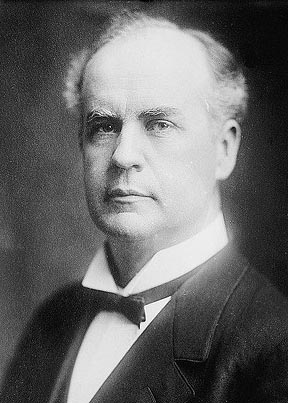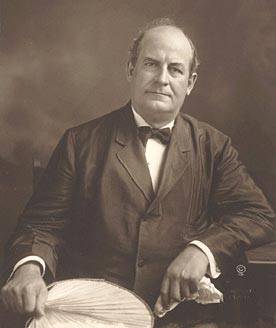Lincoln has seldom been the site of a national political convention, but in July 1920 it hosted such a meeting. “Dry Convention Comes to Order ‘to Bury Booze,'” reported the July 21, 1920, Lincoln Daily Star as the national Prohibition Party met in Lincoln.
“‘We have come together to select a burial lot for John Barley corn,’ said National Chairman Virgil Hinshaw of Chicago, calling to order the thirteenth quadrennial convention of the prohibition party in the city auditorium. A hundred and fifty delegates were present when the gavel fell at 10 a.m.” Aaron S. Watkins of Germantown, Ohio, eventually to be the party’s presidential nominee, gave the keynote address.
Party leaders were reported to be “intent on going forward with plans to run William Jennings Bryan for the presidency regardless of his own wishes in the matter. The national executive committee and prohibition leaders at an informal conference with Charles W. Bryan Tuesday were informed that the Commoner did not desire to be nominated or to run on the ticket.
“Mr. Bryan recommended to the committee that the convention forego a national ticket, and concentrate its efforts on electing ‘dry’ men to congress. In the face of these suggestions the committee announced late Tuesday night that it would proceed to nominate Mr. Bryan unless definite personal word forbidding it was received personally from Mr. Bryan himself, who is now supposed to be on a chautauqua circuit in Wyoming.”
During Bryan’s early career, he had supported many progressive measures, but prohibition was not at the top of his agenda. In his private life, he did not drink alcohol, had taken a temperance pledge as a child, and felt prohibition would contribute to the moral improvement of the individual and society. But his public, political record in Nebraska from 1887 to 1910 was more anti-prohibitionist than prohibitionist.
In 1910 Bryan abandoned his neutral stand on prohibition and began to encourage members of the Democratic Party to follow the “dry” track. He announced that he would introduce a county option plank in the Democratic state convention in 1910 that would enable counties to regulate the sale of alcoholic beverages. He declared that the government had the right to regulate the sale of liquor and that included the right to prohibit the saloon.
With the passage and ratification of the Eighteenth Amendment to the U.S. Constitution in 1919, law enforcement officials all over the nation were charged with stopping “the manufacture, sale, or transportation of intoxicating liquors within, the importation thereof into, or the exportation thereof from the United States . . . for beverage purposes.” The change made the Prohibition Party seem less relevant to many former supporters. Due to Bryan’s refusal to run, the party selected Aaron S. Watkins as its presidential candidate in 1920. Watkins garnered less than 200,000 votes, the poorest showing for the Prohibition Party in a presidential race since 1884.

Aaron S. Watkins was the Prohibition Party’s presidential candidate in 1920. . . .

William Jennings Bryan refused the nomination. NSHS RG3198.



